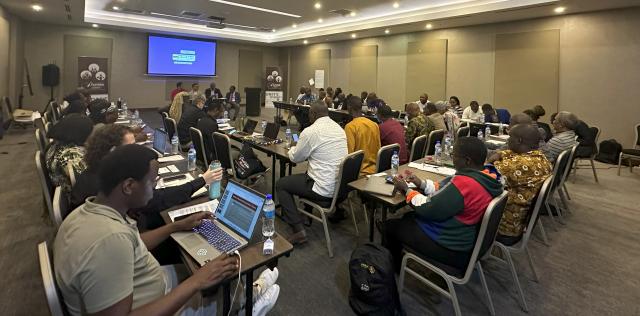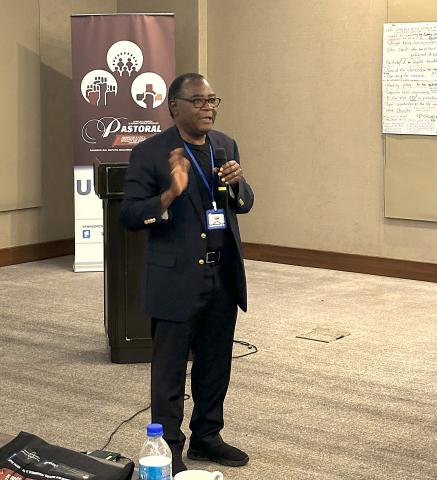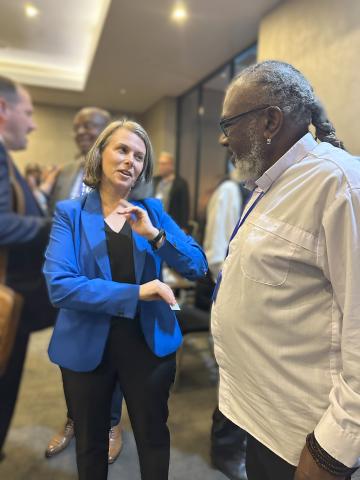Jane Thirikwa shares her experiences at the African faith leaders consultation on Human Sexuality and Gender Diversity in Mozambique.

In late August 2024, 53 delegates from over 10 African countries gathered in Maputo, Mozambique, for a faith leaders consultation on Human Sexuality and Gender Diversity in the African church context. The All Africa Theological Education by Extension Associate (AATEEA), a United Church partner, led the consultation accompanied by The United Church of Canada and local hosts the Christian Council of Mozambique and LAMBDA Association. LAMBDA advocates for the human rights of lesbian, gay, bisexual, and transgender people in Mozambique. I was joined at the consultation by United Church of Canada General Secretary the Rev. Michael Blair, Church in Mission Unit Executive Minister the Rev. Japhet Ndlovu, and Global Partnership Program Team Lead Wendy Gichuru. This was the fourth regional consultation supported by the United Church. Since 2017, others have been held in Canada, Colombia, and the Philippines.

With the theme of “Journeying in Love and Compassion on Human Sexuality and Gender Diversity,” Christian leaders, LGBTQIA+ people, and theology students took part in a dialogue that included how the African Christian church could reimagine gender and sexual diversity in present-day Africa.
Throughout Africa, members of the LGBTQIA+ community face exclusion, discrimination, and violence, often fueled by negative religious rhetoric, including incitement to violence. According to ILGA World, 33 of the 54 African states recognized by the United Nations have laws that criminalize same-sex conduct. Only 9 out of 54 African countries offer some form of legal protection, mainly due to the legacy of colonial laws and religious and politically instigated homophobia, transphobia, and biphobia.

Participants at the consultation shared their thoughts on how gender diversity and human sexuality have historically been and continue to be perceived in the majority of African traditional cultures and the African Christian church. Traditional gender norms match doctrinal norms in many of their denominations. Some faith leaders face challenges in addressing sexuality and gender diversity because of the fear of being stigmatized if they come out as affirming allies, the constraints of colonial language that do not relate to many African contexts, and traditional and sociopolitical perspectives on sexuality.
Members of the LGBTQIA+ community shared how they have been pushed out or hurt by nonaccepting communities of faith. Despite widespread harm against LGBTQIA+ people by many religions, some people from the community are pursuing faith on their own terms, reconciling with it and redefining what it means to be spiritual. They’re pushing back against traumatizing, exclusionary practices to create safer communities for people within faith.
A guest speaker who was born intersex shared their experiences, including working on intersex issues in Asia and engaging with faith communities and civil society on the rights of intersex and gender-nonconforming individuals. Their presentation was incredibly moving and brought much-needed attention to the struggles faced by intersex individuals in Asia, Africa, and the world. They shared that up to 1.7 percent of babies are born with characteristics that do not fit typical definitions of male and female. Some participants shared stories of having heard of intersex children whose parents lock them away in their homes, “prayed for to correct the demonic abomination,” or in some cases killed or abandoned.
“Intersex persons face human rights violations in the form of unnecessary genital ‘normalizing’ surgeries, a lack of appropriate legal recognition and poor birth registration processes, discrimination in the justice system, infanticide, baby dumping and various forms of discrimination in other spheres of life. Religious and cultural beliefs exacerbate the stigma.”
One of the facilitators, a Gender and Theology lecturer at a university in Africa, reflected on the complexities of identity, faith, and inclusion within the African context, where discussions on sexuality, particularly about people of minority sexual orientation and gender identity, are often fraught with tension.
“A key point is the complicity of the Church in perpetuating violence, both through direct actions and the harmful silence surrounding LGBTQIA+ rights and exclusion by the church. The Church must embrace a fundamental commitment to Do No Harm, acknowledging the damage that has already been inflicted on LGBTQI+ individuals. We must stand bold to stop enabling violence with our silence and stopping the harm must be the primary goal, even if minds are not immediately changed.”
Some voices from the more conservative denominations shared that they are bound and abide by their denomination’s policies and constitutions, and that it is unlikely that any amendments will be proposed that do not align with these policies. Another delegate offered a response to this by sharing the metaphor of the Choluteca Bridge in Honduras. Built to be strong and enduring, the bridge remained intact after Hurricane Mitch, but the river beneath it had changed course. This left the bridge as a sturdy structure with no useful function and was henceforth referred to as The Bridge to Nowhere.
“This metaphor highlights the need for flexibility within our churches. Just as the river shifted, the church must also adapt to remain relevant. The COVID-19 pandemic reminded us that the church is not merely a physical building, it is the people. Yet, marginalized groups—such as the poor, LGBTQIA+ individuals, women, and people with disabilities—come to our churches, and we remain rigid with our discrimination and exclusion. We are growing to be irrelevant.”
At the end of the four-day consultation, more faith leaders expressed interest in exploring and attempting a better understanding of scripture as it relates to LGBTQIA+ people and affirming strategies that are better tailored to the African church by African clergy and LGBTQIA+ Africans in their respective countries. This would hopefully better address decades of harmful dogma and practices. The consultation was a welcome step as United Church of Canada partners and ecumenical networks lead us forward.
The discussions demonstrated a shift toward healing and reconciliation and a call for greater support for faith leaders looking to take a bold and prophetic stance on full inclusion. The Rev. Kangwa Mabuluki, AATEEA Secretary General, added that journeying in love and compassion for all, including with LGBTQIA+ people, is a momentous step in the African church where seeds of wisdom and great healing can begin.
Immense gratitude to the All Africa Theological Education by Extension Associate, the Christian Council of Mozambique, and LAMBDA Association for their unwavering commitment to advancing equality and human rights, and for their active role in organizing and supporting this important gathering. We are also thankful to the Canadian High Commission in Mozambique, the Embassy of Norway, the Embassy of the Kingdom of the Netherlands, and the United Nations Development Program for their generous support.
Your support helps to accompany global partners enabling vital visibility. The 2SLGBTQIA+ Global Solidarity Fund supports international consultations with religious leaders, LGBTQIA+ communities, and sponsorships of LGBTQIA+ refugees to Canada. Make a gift today to help advance the rights of 2SLGBTQIA+ people around the world.
—Jane Thirikwa is Program Coordinator, Global Advocacy 2SLGBTQIA+, at the General Council Office.
The views contained within these blogs are personal and do not necessarily reflect those of The United Church of Canada.